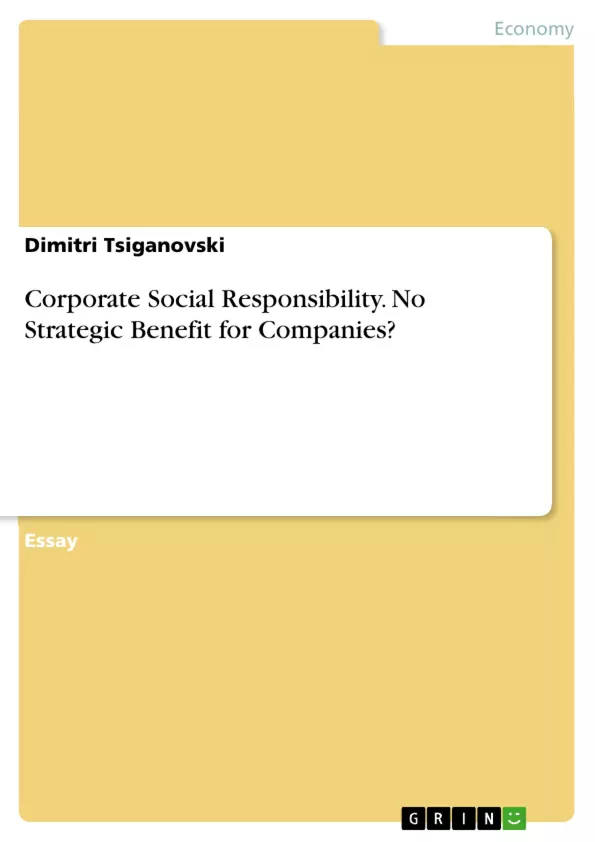Every organisation usually has its own individual strategy in order to achieve its main objectives. Nevertheless, every organisation is also influenced by environmental issues which have an impact on its performance, financial development, growth or in particular its reputation. With regard to the last key word, there is strong debate whether it is a beneficial measure for an organisation to include Corporate Social Responsibility (CSR) to gain strategic and competitive advantages (Ceglinski and Wisniewska, 2016, p. 11) on a long-term basis or whether CSR is just its reaction to environmental issues but without any strategic benefit.
Firstly, this essay will clarify the historical development of CSR, its importance for current organisations in general and which environmental issues give them a reason to include CSR in their daily business under consideration of the increasing public demand for an organisation’s ethical awareness with regard to its activities.
Secondly, it will afterwards critically compare the theories of Milton Friedman and Edward Freeman with regard to CSR in order to analyse whether an organisation can even have social responsibilities considering the fact that companies have different strategic orientations in the business area they are operating in.
Thirdly, it will critically evaluate the direct strategic benefits of CSR and also the risks and disadvantages for an organisation that might occur of its implementation. Finally, the conclusion will clarify whether there is a clear strategic benefit in CSR for an organisation or whether the main focus of CSR are the environmental influences.
Inhaltsverzeichnis (Table of Contents)
- Introduction
- Main Part
- Historical development of CSR and its importance for current companies
- Theoretical Approaches to Corporate Social Responsibility: Friedman vs. Freeman
- Strategic Benefits and Risks of CSR Implementation
- Conclusion
Zielsetzung und Themenschwerpunkte (Objectives and Key Themes)
This essay aims to analyze the role of Corporate Social Responsibility (CSR) in modern business strategy. It explores the historical development of CSR, compares contrasting theoretical perspectives on its relevance, and critically evaluates the strategic benefits and risks of CSR implementation.
- Historical evolution of CSR and its increasing significance for contemporary organizations.
- Contrasting theoretical perspectives on CSR, particularly those of Milton Friedman and Edward Freeman.
- Direct strategic advantages and potential drawbacks associated with CSR implementation.
- The impact of environmental factors and stakeholder expectations on CSR adoption.
- The evolving relationship between business strategy and social responsibility in the modern context.
Zusammenfassung der Kapitel (Chapter Summaries)
- Introduction: This introductory chapter sets the stage by defining the concept of CSR and outlining the essay's key arguments. It emphasizes the growing importance of ethical considerations in business strategy, particularly in response to evolving societal expectations and environmental pressures.
- Historical development of CSR and its importance for current companies: This section traces the historical trajectory of CSR, highlighting its emergence from a solely profit-oriented focus to a more holistic approach that considers social and environmental factors. It examines how companies have increasingly recognized the need to integrate societal concerns into their strategic decision-making processes.
- Theoretical Approaches to Corporate Social Responsibility: Friedman vs. Freeman: This chapter delves into contrasting theoretical perspectives on CSR, comparing the views of Milton Friedman and Edward Freeman. Friedman's shareholder-centric approach emphasizes maximizing profits for shareholders as the primary corporate responsibility, while Freeman's stakeholder theory advocates for considering the interests of all stakeholders, including employees, customers, and the community.
- Strategic Benefits and Risks of CSR Implementation: This section explores the potential strategic advantages and disadvantages of implementing CSR practices. It examines the ways in which CSR can enhance brand reputation, attract and retain talent, and improve access to capital. It also addresses the potential risks associated with CSR, such as increased costs, reputational damage in case of ethical lapses, and potential conflicts between shareholder interests and social responsibility goals.
Schlüsselwörter (Keywords)
Key terms and concepts central to this essay include Corporate Social Responsibility (CSR), business strategy, stakeholder theory, shareholder value, ethical considerations, environmental issues, societal expectations, strategic advantages, and reputational risk.
Frequently Asked Questions
What is Corporate Social Responsibility (CSR)?
CSR refers to a business model where companies integrate social and environmental concerns into their operations and interactions with stakeholders on a voluntary basis.
Does CSR provide a clear strategic benefit for companies?
The essay evaluates whether CSR is a proactive measure for gaining competitive advantages or merely a reaction to environmental issues. Strategic benefits can include improved reputation and long-term financial growth.
How do Friedman and Freeman differ regarding CSR?
Milton Friedman argued that a company's only social responsibility is to increase profits for shareholders. Edward Freeman's stakeholder theory advocates for considering the interests of all groups affected by the business.
What are the risks of implementing CSR?
Risks include increased operational costs, potential conflicts between shareholder and stakeholder interests, and reputational damage if the CSR activities are perceived as insincere.
Why has public demand for ethical awareness increased?
Increased transparency and global environmental issues have led consumers to demand that organizations take responsibility for the social and ecological impact of their activities.
- Quote paper
- Dimitri Tsiganovski (Author), 2019, Corporate Social Responsibility. No Strategic Benefit for Companies?, Munich, GRIN Verlag, https://www.grin.com/document/497918



